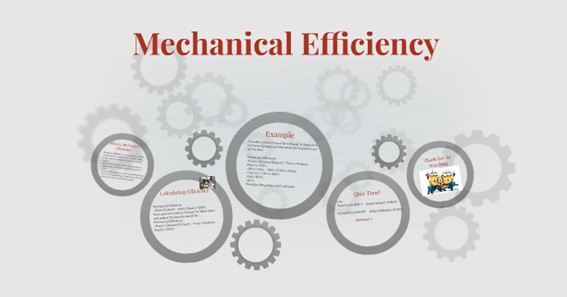Are you curious to know what is mechanical efficiency? You have come to the right place as I am going to tell you everything about mechanical efficiency in a very simple explanation. Without further discussion let’s begin to know what is mechanical efficiency?
In the world of mechanical engineering, optimizing the performance of machines is a key objective. One crucial factor in achieving this goal is mechanical efficiency. In this blog post, we will explore the concept of mechanical efficiency, its significance in various applications, and methods to enhance it for improved machine performance.
What Is Mechanical Efficiency?
Mechanical efficiency refers to the ratio of useful output work to the total input energy or power in a mechanical system. It measures how effectively a machine converts input energy into useful output work while minimizing losses due to friction, heat, and other inefficiencies.
Calculating Mechanical Efficiency:
Mechanical efficiency can be determined using the following formula:
Mechanical Efficiency = (Useful Output Work / Total Input Energy) x 100%
Significance Of Mechanical Efficiency:
- Performance Optimization: Mechanical efficiency plays a crucial role in optimizing the performance of machines. By minimizing energy losses and maximizing output work, it ensures that machines operate at their highest potential, delivering the desired results efficiently.
- Energy Conservation: Improving mechanical efficiency contributes to energy conservation efforts. When machines operate more efficiently, they require less input energy, resulting in reduced energy consumption and a smaller carbon footprint.
- Cost Savings: Enhanced mechanical efficiency leads to cost savings in various applications. Machines that operate efficiently consume less energy, resulting in reduced operating costs over time. Additionally, efficient machines tend to require less maintenance and have longer service lives, leading to reduced repair and replacement expenses.
- Environmental Impact: Efficient machines have a positive impact on the environment. By minimizing energy consumption and waste, they contribute to sustainable practices and help reduce greenhouse gas emissions.
Enhancing Mechanical Efficiency:
- Minimizing Friction: Friction is a significant contributor to energy losses in machines. Implementing lubrication systems, using low-friction materials, and ensuring proper alignment and calibration of moving parts can help reduce friction and improve mechanical efficiency.
- Streamlining Design: Optimal machine design can enhance mechanical efficiency. This involves careful consideration of component size, shape, and material selection to minimize energy losses and maximize output work. Computer-aided design (CAD) and simulation tools can aid in achieving optimal designs.
- Regular Maintenance: Regular maintenance practices, such as cleaning, lubrication, and calibration, are essential for sustaining mechanical efficiency. Monitoring and addressing any signs of wear, misalignment, or component degradation can prevent efficiency losses and extend the lifespan of the machine.
- Advanced Technologies: Incorporating advanced technologies can significantly improve mechanical efficiency. For instance, variable frequency drives (VFDs) allow for more precise control of motor speeds, reducing energy wastage. Smart systems, sensors, and data analysis can provide insights into machine performance and aid in identifying areas for efficiency enhancement.
Conclusion:
Mechanical efficiency is a crucial aspect of machine performance, ensuring optimal energy utilization and output work. By maximizing mechanical efficiency, industries can achieve cost savings, energy conservation, and reduced environmental impact. Implementing strategies such as minimizing friction, streamlining design, regular maintenance, and adopting advanced technologies can lead to significant improvements in mechanical efficiency.
So, whether you are an engineer designing a machine or an industry seeking to optimize performance, prioritizing mechanical efficiency will pave the way for enhanced productivity, cost-effectiveness, and sustainability. Embrace the principles of mechanical efficiency and unlock the full potential of machines to drive progress and innovation in various domains.
FAQ
What Is Meant By Mechanical Efficiency?
Mechanical efficiency (ηm) is described as the ratio between the power input (P) minus the mechanical power loss (PL.m) and the power input itself: Power loss refers primarily to the friction loss in pump bearings (e. g. plain and rolling element bearings) and shaft seals..
What Is The Mechanical Efficiency Formula?
To determine how efficient a machine is, divide the amount of work it produces by the amount of work it requires, then multiply that number by 100 percent.
What Is Mechanical Efficiency In Ic Engine?
The mechanical efficiency of the internal combustion engine is defined as the ratio of the brake power delivered by the engine to the gross indicated power.
What Is Mechanical Efficiency Class 11?
Mechanical advantage is the ratio of load to effort, i.e., Output force to input force. Efficiency is the ratio of work done by a machine to the work done on the machine, i.e., Output work to input work.
I Have Covered All The Following Queries And Topics In The Above Article
What Is Mechanical Efficiency
What Is The Mechanical Efficiency
What Is Mechanical Efficiency?
What Is Mechanical Efficiency Formula
What Is The Mechanical Efficiency Of An Engine
What Is The Formula For Mechanical Efficiency
What Is Mechanical Efficiency Of Pump
What Is The Mechanical Efficiency Of An Engine?
What Is Mechanical Efficiency In Engine
What Is Mechanical Efficiency In Physics
What Is Mechanical Efficiency Formula
What Is Mechanical Efficiency And Thermal Efficiency
What Is The Formula For Mechanical Efficiency
What Is Mechanical Efficiency In Mechanical Engineering
What Is Mechanical Efficiency Of An Engine
What Are The Units For Mechanical Efficiency
What Is Mechanical Efficiency
What is mechanical efficiency of a performance
What is mechanical efficiency?

